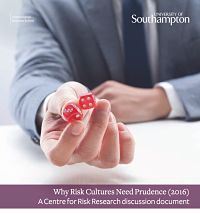Why Risk cultures need prudence. A Centre for Risk Research discussion document.

“… this document will contend that prudence has great potential to serve as the most fundamental concept within any organisation’s risk culture.
Dr Alasdair Marshall, also Prof Johnnie Johnson, Prof Ming-Chien Sung, Dr Melanie Ashleigh, Dr Denise Baden, Dr Mario Brito and Dr Ian Dawson; all of Southampton Business School.
A discussion document published by the University of Southampton’s Centre for Risk Research (CRR).
“This discussion document is … a call to action. It urges organisations to actively support their employees to cultivate prudence. It also advocates prudence as a solid foundation for risk culture.
“It will contend that promoting prudence may achieve:
- Proactive participation in risk management
- Moral courage for candour and whistleblowing
- Vigilance towards reckless risk-taking
- Vigilance towards risk bias
- Ethical behavior generally, and ethical concern over the longer term in particular.
“… prudence has great potential to serve as the most fundamental concept within any organisation’s risk culture. Following the ancient Greeks, it will present prudence as vital to daily life. Also following the ancient Greeks, it will present prudence as something we continually experience and use to develop our self-knowledge.
“More fully, prudence will be regarded as something we use to ensure we do not forget ourselves when situational pressures and narrow psychological drives bound up with our ego-defensive strategies, or our visceral social manoeuvrings, at times conspire to seize control of our thoughts and behaviours.
“… Section Five (prudence and reckless risk-taking) will explain that promoting prudence might equate in large measure to focusing ethical self-governance towards mindfulness of a psychological and ethical malaise that can break out anywhere and at any time in any organisation: false prudence.
“The case for basing risk culture on prudence will become much more distinctive and compelling when it is explained that false prudence corresponds to a very common pattern of psychological and ethical derailment likely to be responsible for much reckless risk-taking within organisations.”
Access the document here: Why Risk cultures need prudence






Leave a comment
Back to the top